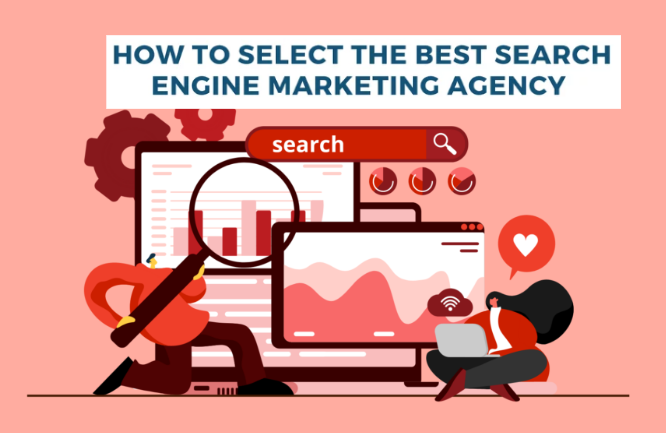Are you looking for ways to boost your online presence and attract more customers? Do you want to increase your website traffic and generate more leads and sales?
If you answered yes to these questions, then you need to learn about Search Engine Marketing (SEM).
SEM is a powerful online marketing strategy that involves using paid and organic methods to improve your website’s visibility and ranking on search engines. By using SEM, you can reach your target audience at the right time and place, and drive them to your website.
In this article, we will explain what SEM is, why it’s important for website traffic, and how to choose the best SEM agency for your business.
Short Summary
-
Search Engine Marketing (SEM) is a crucial strategy for driving targeted traffic to your website and increasing online visibility.
-
Partnering with a reputable SEM agency can greatly enhance your chances of success by leveraging their expertise and experience.
Understanding Search Engine Marketing (SEM)

Search Engine Marketing (SEM) is a digital marketing strategy that involves promoting websites by increasing their visibility in search engine results pages (SERPs) through paid search advertising and search engine optimization (SEO) techniques. An SEM agency is a digital agency that provides search engine marketing services.
SEM combines the power of paid advertising and organic search optimization to drive targeted traffic to a website.
In this section, we will explore the components of SEM and the benefits it offers in terms of website traffic.
Definition and Components of SEM
Search Engine Marketing comprises several key components that work together to improve a website’s visibility and drive traffic. These components include:
Paid Search Advertising (PPC)
Paid search advertising, also known as Pay-Per-Click (PPC) advertising, allows businesses to display their ads prominently on search engine results pages. Advertisers bid on specific keywords relevant to their products or services, and their ads are displayed when users search for those keywords.
Advertisers only pay when their google ads are clicked, making it a cost-effective strategy. PPC offers immediate visibility and control over ad placements, making it an integral part of SEM.
Search Engine Optimization (SEO)
Search engine optimization involves optimizing a website’s content, structure, and other factors to improve its visibility in organic search results. SEO techniques aim to improve a website’s ranking on search engine results pages, making it more likely to attract organic traffic.
Key SEO strategies include optimizing website content, meta tags, URLs, and building high-quality backlinks. SEO is a long-term approach that focuses on improving website authority and relevance for targeted keywords.
Keyword Research and Targeting
Keyword research is a critical aspect of SEM. It involves identifying and targeting the most relevant and high-performing keywords that users are searching for.
Effective keyword research enables businesses to understand their target audience’s search intent and optimize their content and PPC campaigns accordingly. By targeting the right keywords, businesses can increase their visibility and attract quality traffic to their website.
Ad Copywriting and Optimization
Ad copywriting involves creating compelling and relevant ads that resonate with the target audience. Well-crafted ad copy should attract attention, convey the value proposition, and include a clear call-to-action.
Continuous optimization of ad copy is crucial to improve click-through rates and overall ad performance. A/B testing, analyzing ad metrics, and refining ad copy based on performance data are essential practices in SEM.
Benefits of SEM for Website Traffic
Immediate Visibility and Exposure
SEM allows businesses to quickly gain visibility on search engine results pages through paid ads. This instant exposure can help drive targeted traffic to a website, especially for new businesses or those seeking to promote specific products, events, or time-sensitive offers.
Targeted Audience Reach
SEM offers precise targeting options, allowing businesses to reach their ideal audience based on factors such as location, demographics, interests, and search intent. By focusing on highly relevant keywords and demographic targeting, businesses can attract quality traffic that is more likely to convert into customers.
Measurable Results and ROI
SEM provides detailed analytics and performance metrics that enable businesses to measure the success of their campaigns. Metrics like click-through rates, conversion rates, and cost per conversion allow businesses to assess the ROI of their SEM efforts accurately.
The ability to track and analyze campaign performance helps optimize strategies, allocate budgets effectively, and achieve maximum return on investment.
Synergy with Other Marketing Channels
SEM can work synergistically with other marketing channels, creating a cohesive and integrated digital marketing strategy. By aligning SEM efforts with social media marketing, content marketing, email marketing, and other digital marketing services, businesses can amplify their overall marketing impact.
For example, driving traffic to a well-optimized landing page through SEM and then engaging visitors with targeted email marketing campaigns can increase conversions and maximize the value of website traffic.
Adaptable and Scalable Strategies
One of the significant advantages of SEM is its flexibility and scalability. SEM strategies can be adjusted and optimized in real-time based on the performance data and market trends. If certain keywords or ad campaigns are not delivering the desired results, adjustments can be made to improve performance.
Additionally, as businesses grow and expand, SEM campaigns can be scaled up to target new markets or products, resulting in increased website traffic as the business evolves.
Factors to Consider When Selecting an SEM Agency

Selecting the right SEM agency is crucial for the success of your website traffic and overall digital marketing efforts. With numerous search engine marketing agencies claiming expertise in SEM, it is essential to consider specific factors to ensure you partner with an agency that can deliver results.
The following factors should be taken into account when choosing an SEM agency.
Experience and Expertise in SEM Strategies
An important factor to consider is the agency’s experience and expertise in search engine marketing strategies. Look for agencies that have a proven track record of implementing successful SEM campaigns across various industries. Consider the number of years the agency has been in business, their knowledge of industry best practices, and their ability to adapt to the ever-evolving digital landscape.
Client Portfolio and Success Stories
Reviewing the agency’s client portfolio and success stories can provide valuable insights into their capabilities and results. Look for case studies or client testimonials that highlight how the agency has helped businesses increase website traffic through their SEM strategies. A strong and diverse client portfolio demonstrates the agency’s ability to work with different industries and deliver positive outcomes.
Industry Knowledge and Understanding
A search engine marketing company with industry-specific knowledge and understanding can provide a competitive advantage. They should be well-versed in the dynamics and trends of your industry, allowing them to develop tailored SEM strategies that resonate with your target audience. Industry expertise enables the agency to identify relevant keywords, understand customer behavior, and implement effective tactics to drive website traffic.
Proven Track Record of Driving Website Traffic
One of the primary objectives of partnering with an search engine marketing agency is to increase website traffic. Therefore, it is crucial to assess the agency’s track record in achieving this goal. Look for verifiable results and data that demonstrate the agency’s ability to generate substantial traffic for their clients. Analyze metrics such as organic search rankings, click-through rates, conversion rates, and overall website traffic growth.
Transparency and Communication
Transparency and effective communication are vital when working with an SEM agency. Ensure that the agency is willing to share their strategies, provide regular updates on campaign progress, and offer clear reporting on key performance metrics. Open and transparent communication fosters trust and allows you to assess the agency’s impact on your website traffic.
Alignment with Your Business Goals and Values
Choose an SEM agency that aligns with your business goals, values, and brand image. They should understand your target audience, unique selling propositions, and marketing objectives. A strong alignment between your business and the agency will ensure a collaborative partnership and maximize the effectiveness of SEM strategies in driving website traffic.
How to Choose the Right SEM Agency for Your Business

Defining Your Goals and Objectives
-
Identify Your Target Audience and Marketing Budget: Before selecting an SEM agency, it is essential to clearly define your target audience and understand their demographics, interests, and online behavior. This information will help the agency develop effective SEM strategies to reach and engage your desired audience. Additionally, consider your marketing budget and determine how much you are willing to invest in SEM to achieve your website traffic goals.
-
Determine Specific Goals for Website Traffic Growth: Set clear and measurable goals for website traffic growth. Define key performance indicators (KPIs) such as organic search rankings, click-through rates, conversion rates, google analytics, and overall website traffic volume. Establishing specific goals will help you evaluate the effectiveness of the SEM agency’s efforts and ensure alignment with your overall business objectives.
Evaluating Agency Capabilities
-
Consider the Agency’s Expertise in Your Industry: Look for an SEM agency that has experience and expertise in your specific industry. Understanding the nuances and dynamics of your industry is crucial for developing effective SEM strategies. An agency familiar with your industry can quickly grasp your business’s unique challenges and opportunities and tailor their approach to drive website traffic within your industry’s competitive landscape.
-
Assess Their Strategies for Driving Website Traffic: Evaluate the SEM agency’s approach to driving website traffic. Inquire about their keyword research and targeting strategies, SEO services, PPC campaign management techniques, on-page and off-page optimization methods, and content creation strategies. A reliable agency will have a systematic approach that combines different SEM components to achieve optimal results. Ensure their strategies align with your goals and resonate with your target audience.
-
Request Case Studies and References: Ask the SEM agency to provide case studies or references from their previous clients. Case studies showcase the agency’s ability to deliver tangible results and drive website traffic. Look for case studies that demonstrate the agency’s expertise in improving organic search rankings, increasing click-through rates, and generating conversions. Contact references to gather firsthand feedback on their experience working with the agency.
Budget Considerations
-
Discuss Pricing Models and Payment Structures: Have a transparent discussion with the SEM agency about their pricing models and payment structures. Some agencies charge a flat fee, while others work on a performance-based model or charge a percentage of ad spend. Understand their billing methods and ensure they fit within your budgetary constraints. Additionally, discuss any potential additional costs such as campaign setup fees or ongoing management fees.
-
Analyze the Potential Return on Investment: When evaluating SEM agencies, consider the potential return on investment (ROI) they can deliver. Assess the agency’s ability to drive website traffic, improve conversion rates, and ultimately generate revenue. Ask for projected results based on their past performance to gauge the potential ROI. A reputable agency should be able to provide realistic expectations and demonstrate how their strategies can contribute to your business’s growth.
Conclusion
In today’s digital landscape, Search Engine Marketing (SEM) plays a vital role in increasing website traffic and driving business growth. By leveraging SEM strategies such as paid search advertising (PPC) and search engine optimization (SEO), businesses can achieve immediate visibility, target their audience effectively, and measure the success of their campaigns. However, to maximize the benefits of SEM, partnering with a reputable SEM agency is essential.
A reputable SEM agency brings valuable expertise, experience, and industry knowledge to the table. They understand the complexities of SEM, stay updated with the latest trends, and have a proven track record of driving website traffic for their clients. Working with such an agency provides a competitive advantage, ensuring that your SEM strategies are implemented effectively, leading to increased visibility, higher-quality traffic, and improved conversions.
Ready To Boost Your Website Traffic And Achieve Online Success?
Partner with Hook Agency, a premier search engine marketing agencyspecializing in driving targeted traffic and maximizing your online visibility.
Don’t miss out on the opportunity to elevate your brand and reach your target audience effectively.
Visit our website today at www.hookagency.com and schedule a consultation to discover how we can take your website traffic to new heights. Take the first step towards online success with Hook Agency now!
Frequently Asked Questions (FAQs)
What is Search Engine Marketing (SEM)?
Search Engine Marketing (SEM) refers to the practice of utilizing paid search advertising and search engine optimization techniques to increase a website’s visibility and drive targeted traffic from search engine result pages (SERPs). It involves strategies such as keyword research, ad copywriting, bid management, and optimizing website content to improve search engine rankings.
How does SEM differ from SEO?
While both SEM and SEO aim to increase website visibility on search engines, they differ in their approaches. SEM involves paid advertising, where businesses bid on keywords and pay for each click (Pay-Per-Click or PPC). SEO, on the other hand, focuses on optimizing website content, improving site structure, and obtaining organic rankings in search results. SEM provides immediate visibility, while SEO is a long-term strategy for sustainable organic traffic growth.
What are the benefits of SEM for increasing website traffic?
SEM offers several benefits for increasing website traffic, including immediate visibility and exposure, targeted audience reach, measurable results, and a high return on investment (ROI). By targeting specific keywords and demographics, businesses can attract relevant traffic to their websites and increase the likelihood of conversions and sales.
How long does it take to see results from SEM?
The time it takes to see results from SEM can vary depending on various factors, including the competitiveness of keywords, the effectiveness of campaign strategies, and the budget allocated. While some businesses may see immediate results in terms of increased website traffic, it generally takes a few weeks to several months to fully optimize campaigns and observe significant improvements.
Why should I partner with an SEM agency?
Partnering with an SEM agency offers numerous advantages. Agencies have expertise in SEM strategies and stay updated with industry trends and algorithm changes. They can develop customized campaigns based on your business goals, target the right keywords, and optimize ad campaigns for maximum impact. An agency can save you time, provide valuable insights, and deliver measurable results, ultimately helping you drive more website traffic.
How do I choose the right SEM agency for my business?
When choosing an SEM agency, consider factors such as their experience and expertise in SEM strategies, client portfolio and success stories, industry knowledge, and a proven track record of driving website traffic. Evaluate their strategies, request case studies and references, discuss pricing models and ROI projections, and ensure that their values and communication style align with your business needs.
Can I manage SEM campaigns on my own without an agency?
While it is possible to manage SEM campaigns on your own, it can be complex and time-consuming. SEM requires ongoing optimization, keyword research, ad copywriting, bid management, and data analysis. Partnering with an experienced SEM agency can provide you with the expertise, resources, and industry insights to maximize the effectiveness of your campaigns and drive significant website traffic.
















